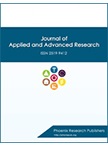Analytic study on strengthening the Future Education competencies in Korea
DOI:
https://doi.org/10.21839/jaar.2023.v8.8267Keywords:
Future education, Competency, Teacher, CapabilityAbstract
The purpose of this study is to devise and present an educational model to strengthen pre-service elementary school teachers’ future competencies based on the effects of existing core competency education. For this purpose, a literature study was conducted to examine the concepts and directions of future education and core competencies, core values, teaching and learning models and instructional design principles, components and instructional design procedures, and major characteristics of the 2015 revised curriculum of Korea. After the second expert validation of the developed draft was conducted, it was revised and supplemented to complete the final model of the education model for fostering future education capabilities. Based on the future education competencies obtained through literature research and the Delphi survey, a survey was conducted on professors, in-service elementary school teachers, and pre-service teachers to present the final future core competencies. Specifically, in order to find a framework suitable for the needs and competencies of instructors, previous research cases in and outside of Korea were analyzed, and surveys were conducted with pre-service and in-service teachers, and analyzed. Through this, the focus was on presenting specific methods for the expression of future teaching capabilities as instructors and providing an efficient roadmap to keep up with the overall trend of the education field according to the needs of the times.
Downloads
References
Borich, G. D. (1980). A needs assessment model for conducting follow-up studies. Journal of Teacher Education, 31(3), 39-42. https://doi.org/10.1177/002248718003100310
Castek, J., Harris, K., Jacobs, G., & Vanek, J. (2022). 21st Century Learning Ecosystem Opportunities: Research and Findings. Language. Literacy Language & Technology Research Group and World Education. Retrieved from https://edtech.worlded.org/21cleo-report
Choi, S.-J. (2020). A study on the OECD Education 2030 project: Implementation strategies of future-oriented competency-based education. Korea Educational Development Institute, PR 2019-06.
Kim, J. (2021). Current Status and Implications of Artificial Intelligence (AI) Convergence Education in the United States. Overseas Education Trends of the Korea Educational Development Institute. Retrieved from https://edpolicy.kedi.re.kr/frt/boardView.do?nTbBoardSeq=&strCurMenuId=10091&nTbCategorySeq=&pageIndex=1&pageCondition=10&nTbBoardArticleSeq=830279&searchTopic=&searchObject=&searchCondition_D=36&searchKeyword_SD=&searchKeyword_ED=&searchCondition_W=6&searchKeyword_W=
Moon, E., Shin, W. S., & Park, I. (2016). An analysis of Pre-service Teachers’ Perception on the Core Competence of Teachers. The Korea Educational Review, 22(1), 183-209.
Namgung, O. (2015). Competency-based Teacher Education in Finland. Retrieved from https://edpolicy.kedi.re.kr/frt/boardView.do?strCurMenuId=54&pageIndex=1&pageCondition=10&nTbBoardArticleSeq=150115
Singapore’s Ministry of Education. (2022). Retrieved from https://www.moe.gov.sg/education-in-sg/21st-century-competencies





 .
.